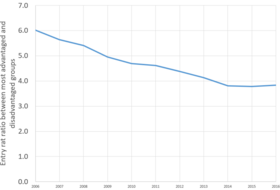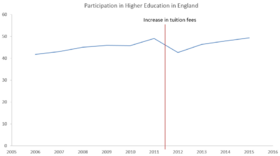Tuition fees in the United Kingdom facts for kids
Tuition fees are payments students make to study at a university or college. In the United Kingdom, these fees help pay for teaching and other costs for students studying for their first degree or other higher qualifications.
Tuition fees were first introduced across the UK in September 1998. At that time, students had to pay up to £1,000 a year. However, only people earning above a certain amount (like £21,000) actually pay these fees back through their taxes. This means that for many students, especially those from lower-income families, university education in England can still feel free when they start.
The government helps students from poorer backgrounds go to university. Because of this, many students, including those who might not have had the chance before, are now attending universities in England. The rules for tuition fees are different in Scotland, Wales, and Northern Ireland because these parts of the UK have their own governments. The Student Loans Company helps manage student loans and payments.
Contents
History of University Fees in the UK
For many years, from 1945 onwards, students in the UK did not pay tuition fees directly. Local councils usually covered these costs. A law passed in 1962 made it official that local authorities would pay the fees. This meant that going to university was effectively free for students until 1998.
The Dearing Report and First Fees (1998)
In 1996, the government asked Sir Ron Dearing to lead a study on how to fund universities for the next 20 years. His report, published in 1997, said that universities would need billions more pounds to teach more students and improve facilities.
The report suggested that students might need to help pay for their education. It said that asking graduates (people who have finished university) to contribute to tuition costs made sense. This was because it could help make things fairer between different groups of people and bring in new money just for universities.
Following this report, a new law was passed in 1998. This law introduced tuition fees across all parts of the United Kingdom. It also changed how students received money for living costs. Instead of grants (money you don't pay back), students would get loans that they would repay once they earned enough money.
After 1999, Scotland and Wales, which now had their own governments, made their own rules about tuition fees. Scotland later stopped charging a "graduate endowment" fee. Wales introduced grants to help students with living costs, which have increased over time.
Higher Fees Introduced (2004)
In England, the amount universities could charge for tuition fees went up in 2004. From the 2006-07 school year, universities could charge up to £3,000 a year. This change caused some debate in politics, especially because Scottish politicians helped the law pass by a very small number of votes.
This higher fee system was also introduced in Northern Ireland in 2006-07 and in Wales in 2007-08. By 2009-10, the fee limit had risen slightly to £3,225 due to inflation (the rising cost of living).
The Browne Review and £9,000 Fees (2012)

Tuition fees were a big topic in the 2010 general election. The Liberal Democrat party had promised to get rid of tuition fees. However, when they formed a government with the Conservative party, who wanted to increase fees, they changed their mind.
After a study called the Browne Review, the fee limit was raised to £9,000 a year. This was about three times higher than before and led to large student protests in London. The government thought most universities would charge around £6,000, with £9,000 only for special cases. But in reality, most universities immediately started charging the full £9,000.
A legal challenge against these higher fees failed in 2012, and the new system started that September. The Liberal Democrats later said that changing their mind on fees contributed to them losing many seats in the 2015 election.
Later Changes and Frozen Fees (2018 onwards)
In 2018, Prime Minister Theresa May started a review of how education after age 18 was funded. This included looking at university funding and other ways to pay for it. This was partly to try and win back support from students.
The review led to more focus on vocational studies (training for specific jobs) in England. Later, in 2020, the Labour Party leader, Keir Starmer, initially promised to get rid of tuition fees. However, he later suggested that Labour might not make university free if they won the next election.
University fees remained frozen at £9,250 into the early 2020s. By 2023, this caused problems for universities because high inflation meant that £9,250 was worth much less than it was in 2012. Many universities started losing money on UK students. They often made up the difference by charging international students much higher fees.
Current Systems for Tuition Fees
The way tuition fees work is different in each part of the UK.
England's Fee System
In England, undergraduate tuition fees are capped at £9,250 a year for students from the UK and Ireland. Since Brexit, students from the EU, EEA, and Switzerland usually have to pay higher fees and cannot get UK government loans unless they have special immigration status. Most universities charge the full amount of tuition fees. Students can get a loan to cover these fees.
The fee cap was supposed to increase with inflation after 2017-18. However, in October 2017, Prime Minister Theresa May announced that fees would be temporarily frozen at £9,250. This freeze has continued, leading to financial challenges for universities.
Impact of Fees in England
Some people worried that higher tuition fees in England would stop poorer students from applying to university. However, the difference between the number of rich and poor students going to university has actually become slightly smaller. This might be because universities have used the money from fees to offer financial help and support programs.
Studies have shown that introducing tuition fees has led to more money for universities, more students enrolling, and a smaller gap between advantaged and disadvantaged students attending university.
Northern Ireland's Fee System
In Northern Ireland, tuition fees are currently capped at £4,030. Students can get loans for this amount from Student Finance NI. Students start paying back their loans when their income goes above £17,335 a year.
Scotland's Fee System

In Scotland, the Student Awards Agency Scotland (SAAS) handles tuition fees. They generally do not charge fees for "Young Students" from Scotland and Ireland. Young Students are usually under 25, without children or a partner, and haven't been out of full-time education for long.
For students from the rest of the UK, undergraduate tuition fees are usually £9,250. For international students, fees can range from £10,000 to £26,000 per year. At the postgraduate level, fees are similar for Scottish and UK students, but higher for international students.
The Scottish system has been in place since 2007. Some have criticized it for not doing enough to help students from poorer backgrounds. Scotland has fewer disadvantaged students than England, Wales, or Northern Ireland.
Wales's Fee System
In Wales, tuition fees are capped at £9,250 for all UK students as of September 2024. Welsh students can get a loan to cover 100% of their tuition fees, no matter where they study in the UK.
The system changed in 2018. Now, students can get a loan based on their family's income. Students from the poorest families can get a grant of up to £10,124 if they study in London, or up to £8,100 if they study elsewhere in the UK. The Welsh Government believes these changes help more students attend university by providing better support for living costs.
Interest on Student Loans
Students and graduates pay interest on their student loans. Interest starts building up from the very first payment. For students who started university after 2012, the interest rate is based on the Retail Price Index (RPI) plus up to 3%, depending on how much they earn.
For example, in 2018, interest fees rose to 6.3% for those who started studying after 2012. If students do not keep their details updated with the Student Loans Company, they might face a higher interest rate on their loan.
Other Ways to Fund University
People have suggested two main alternative ways to pay for university studies:
- Funding from general taxation: This means the government would pay for university using money collected from everyone's taxes.
- A graduate tax: This would mean that once students finish university and start working, they would pay an extra tax on their income for a certain period.
Paying Through General Taxation
In some countries, like Germany, university tuition is paid for by general taxes. However, fewer young people go to university in Germany compared to the UK. Some people argue that paying for university through general taxes is like a "tax cut for the rich" because everyone pays for something that mostly benefits graduates, who often earn more money.
Jeremy Corbyn, a former leader of the Labour Party, wanted to remove tuition fees and pay for higher education by increasing national insurance and corporation tax. This plan was expected to cost the government about £8 billion a year.
Paying Through a Graduate Tax
A graduate tax has been suggested as a way to replace fees. However, one challenge with a graduate tax is that it might be hard to collect money from students who move to a different country after graduating.




